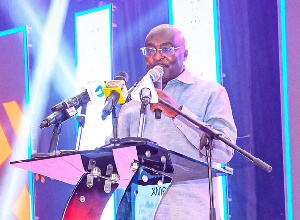- Home - News
- Polls
- Year In Review
- News Archive
- Crime & Punishment
- Politics
- Regional
- Editorial
- Health
- Ghanaians Abroad
- Tabloid
- Africa
- Religion
- Election 2020
- Coronavirus
- Photo Archives
- News Headlines
- Press Release
General News of Tuesday, 21 January 2020
Source: ghananewsagency.org
Year of Return: Community releases land for Restorative Eco-village
As part of efforts to support Government’s Year of Return initiative, the Chief and people of Amonookuma in the Abura-Asebu-Kwamankese (AAK) District, have released a 50-acre land to the Diasporan Community to construct ‘Restorative Eco-village’.
The land would serve as the place of settlement for the people of African Descent, who would wish to return home for investment purposes.
The ‘Year of Return, Ghana 2019’, was a major landmark marketing campaign that targeted the return of African-Americans to settle home and invest as the world marked 400 years of the first enslaved Africans arrive in Jamestown, Virginia.
At a ceremony to handover the land to the Diasporans at Amissakrom-Ekroful, Nana Sakyi V, the Chief of Amonookuma, expressed delight about the return of many Africans from the Diaspora, describing the gesture as a prophecy fulfilled.
“I can proudly say that the spirit of our ancestors have led you back to your roots”, he said, and prompted them of the many investment opportunities in the Central Region, particularly in Amonookuma.
“The Year of Return serve as a fertile ground for you to come and contribute your quota to the development of your motherland,” he added.
“I give you this land, which was apportioned to you by birth and have since awaited your arrival so that you can establish yourself and assist in developing Amonomkuma town.”
The Chief implored members of the community to offer the necessary support to make the diasporans feel at home and contribute to the development of the town.
Ahmahtsiyahu Ben Yisrael, Board member of Bamboo Roots Collective, commended the Chief and the people for heeding to the call and encouragement by President Akufo-Addo to embrace and welcome them back to Africa.
Bamboo Roots Collective is a cooperative works organization, which comprised indigenous and Africans in the Diaspora with the purpose of establishing off-grid self-sustaining communities in Africa.
Mr Yisrael underscored the importance of ecological accountability and responsibility and hoped that establishing viable communities across Ghana would plant the necessary seeds of sovereignty to assist in solidifying the Ghana Beyond Aid agenda.
“Our aim is to be among successful examples of sustainable communities and infrastructure that assist in the efforts of the President’s visionary trajectory of “beyond the return,” he said.











